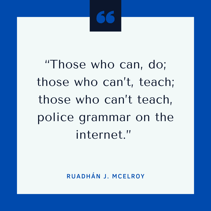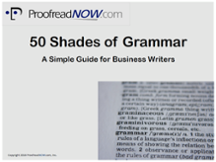
Using or Dropping the “Year Old” Hyphen
First of all, you’re not silly or dumb for being confused over this. The problem is that ages are used as different parts of speech and in different orders in a sentence.
That makes all the difference as to whether you need a hyphen for clarity.
Here are the simple rules you need to know to hyphenate ages correctly:
Hyphenate an Age Being Used as a Noun
Nouns are words for people, places, things, or ideas. Ages are being used as nouns in the following:
- I think six-year-olds are the cutest because they haven’t lost their baby cheeks.
- An eighty-year-old is bound to be wiser than a twenty-year-old.
- A recipe for silliness: fifteen-year-olds and helium balloons.
Essentially, you’re using hyphens to group the related words together as a single noun.
Hyphenate an Age Being Used as an Adjective Before a Noun
In this case, you’re using an age to a describe the noun that follows it. In order to prevent confusion, you should hyphenate the adjective “group.” Check out these examples:
- My three-year-old brother eats peas one at a time.
- I would be scared to live in a 300-year-old house.
- The man’s forty-year-old painting business was passed to his sons.
Hyphenate But Spell Out an Age at the Beginning of a Sentence
Just in case there’s any confusion over what to do when a sentence starts with an age (as a noun or an adjective): Keep the hyphen but spell out the age. See more on ages as words versus numerals below.
- Sixty-five-year-old Harry Longbottom was cited for kicking his neighbor’s trashcan down the street.
- Eight-year-old Em Andem is known to be a very sweet girl.
- Ten-year-olds run so much faster than I.
Don’t Hyphenate an Age Being Used as an Adjective After a Noun
If the age is describing a noun but comes after that noun, don’t use hyphens. The relation to the noun and the meaning are more obvious. However, you still need hyphens in numbers that are always hyphenated when spelled out (e.g., sixty-five, twenty-one, ninety-eight). Otherwise, you can be footloose and hyphen-free. For example:
- My son is eighty-four years old, so you can guess that I’m no spring chicken.
- Dad, can I ride my bike to school when I’m seven years old?
- Kids born in the year 2000 are now over twenty years old!
Don’t Hyphenate Ages in Long Noun Phrases
This is rarer than the previous examples, but sometimes you need to describe an age group in a range. In order to make your writing easy to read and understand, keep long hyphenated noun phrases to a minimum. Instead of, for example, “20-to-45-year-olds,” consider simplifying the phrase to “people ages 20 to 45.”
Numerals vs. Words for Ages
The two most prominent style guides in B2B writing are The Chicago Manual of Style and the AP Stylebook. They differ on the approach to ages.
- Chicago: Spell out (use words) for ages 100 and lower.
- AP: Always use numerals for ages (e.g., an 8-year-old, 258 years old, the 3,000-year-old pyramid).
If you don’t use either of these style guides, then stick with your preference as long as:
- It won’t confuse your readers.
- You’re consistent with whatever “rules” you apply.
Still have questions? Submit them in the comments and we’ll answer them. Please begin each question with “Oh, Hyphen Master” or similar. Just kidding.




